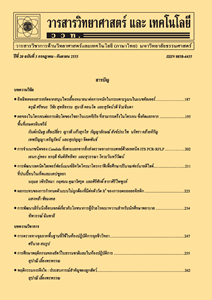ฤทธิ์ยับยั้งการเจริญและการแพร่กระจายของเซลล์มะเร็งปอด A549 ของสารแอนโดรกราโฟไลด์ที่แยกจากฟ้าทะลายโจร
Main Article Content
Abstract
Lung cancer has been a disease with high fatality rate due to the high metastatic rate. One of the most essential processes of metastasis is the ability of cancer cells to undergo the epithelial to mesenchymal transition (EMT) which allows cancer cells to resist the programmed cell death in a detached condition and to migrate into the surrounding organ tissue. Andrographolide has been a promising naturally derived compound for cancer therapy due to several cytotoxic effects in various cancer cells. Therefore, this study has demonstrated that andrographolide inhibits cell proliferation and metastasis process in A549 human lung cancer cells. Cytotoxicity of andrographolide on A549 and Vero cells using MTT assay showed that andrographolide decreased the viability of A549 human lung cancer cells with IC50 value at 5.51 µg/mL, whereas it performed non-cytotoxic against Vero normal cell lines. Furthermore, andrographolide decreased the migration process. As the results, andrographolide is found to be a potential compound for studying its mechanisms to further develop as cancer therapeutic drug.
Article Details
References
[2] Zhu, X. and Li, J.I.N., 2010, Gastric carcinoma in China: Current status and future perspectives (review), Oncol. Lett. 1: 407-412.
[3] Marcaccini, A..M., Meschiari, C.A., Zuardi, L.R., de Sousa, T.S., Taba, M., Teofilo, J.M., Jacob-Ferreira, A..L, Tanus-Santos, J.E., Novaes, A.B. and Gerlach, R.F., 2010, Gingival crevicular fluid levels of MMP-8, MMP-9, TIMP-2, and MPO decrease after periodontal therapy, J. Clin. Periodontol. 37: 180-190.
[4] Department of Medical Sciences, Ministry of Public Health, Thailand, 2007, Thai Herbal Pharmacopoeia, Volume II, Office of Notional Buddishm Press, Bangkok.
[5] Akhtar, M.T., Bin Mohd Sarib, M.S., Ismail, I.S., Abas, F., Ismail, A., Lajis, N.H. and Shaari, K., 2016, Anti-Diabetic activity and metabolic changes Induced by Andrographis paniculata plant extract in obese diabetic rats, Molecules 21(8): E1026.
[6] Low, M., Khoo, C.S., Münch, G., Govindaraghavan, S. and Suche, N.J., 2015, An in vitro study of anti-inflammatory activity of standardised Andrographis paniculata extracts and pure andrographolide, BMC Comp. Altern. Med. 15(1): 18.
[7] Menon, V. and Bhat, S., 2010, Anticancer activity of andrographolide semisynthetic derivatives, Nat. Prod. Commun. 5: 717-720.
[8] Dai, L., Wang, G. and Pan, W., 2017, Andrographolide inhibits proliferation and metastasis of SGC7901 gastric cancer cells, BioMed Res. Inter. 2017: 1-10.
[9] Liu, Z., Law, W.K., Wang, D., Nie, X., Sheng, D., Song, G., Guo, K., Wei, P., Ouyang, P., Wong, C.W. and Zhou, G.C., 2014, Synthesis and discovery of andrographolide derivatives as non-steroidal farnesoid X receptor (FXR) antagonists, RSC Adv. 4: 13533-13545.
[10] Kaewpiboon, C., Lirdprapamongkol, K., Srisomsap, C., Winayanuwattikun, P., Yongvanich, T., Puwaprisirisan, P, Svasti, J. and Assavalapsakul, W., 2012, Studies of the in vitro cytotoxic, antioxidant, lipase inhibitory and antimicrobial activities of selected Thai medicinal plants, BMC Comp. Altern. Med. 12: 217-222.
[11] Rajani, M., Shrivastava, N. and Ravishankara, M.N., 2000, A rapid method for isolation of andrographolide from Andrographis paniculata Nees (kalmegh), Pharm. Biol. 38: 204-209.
[12] National Center for Biotechnology Information, 2018, Andrographolide, Available Source: https://pubchem.ncbi.nlm.nih.gov/compound/5318517PubChemCompoundDatabase;CID=5318517, May 1, 2018.
[13] Zhao, F., He, E.Q., Wang, L. and Liu, K., 2008, Anti-tumor activities of andrographolide, a diterpene from Andrographis paniculata, by inducing apoptosis and inhibiting VEGF level, J. Asian Nat. Prod. Res. 10: 467-473.
[14] Hsieh, M.J., Lin, C.W., Chiou, H.L., Yang, S.F. and Chen, M.K., 2015, Dehydroandrographolide, an iNOS inhibitor, extracted from Andrographis paniculata (Burm.f.) Nees, induces autophagy in human oral cancer cells, Oncotarget 6: 30831-30849.
[15] Shao, F., Tan, T., Tan, Y., Sun, Y., Wu, X. and Xu, Q., 2016, Andrographolide alleviates imiquimod-induced psoriasis in mice via inducing autophagic proteolysis of MyD88, Biochem. Pharm. 115: 94-103.
[16] Lee, Y.C., Lin, H.H., Hsu, C.H., Wang, C.J., Chiang, T.A. and Chen, J.H., 2010, Inhibitory effects of andrographolide on migration and invasion in human non-small cell lung cancer A549 cells via down-regulation of PI3K/Akt signaling pathway, Eur. J. Pharm. 632: 23-32.
[17] Islam, M.T., Ali, E.S., Uddin, S.J., Islam, M.A., Shaw, S., Khan, I.N., Saravi, S.S.S., Ahmad, S., Rehman, S., Gupta, V.K., Gaman, M.A., Gaman, A.M., Yele, S., Das, A.K., Castro, E.S.J.M., Moura Dantas, S.M.M., Rolim, H.M.L., Carvalho Melo-Cavalcante, A.A., Mubarak, M.S., Yarla, N.S., Shilpi, J.A., Mishra, S.K., Atanasov, A.G. and Kamal, M.A., 2018, Andrographolide, a diterpene lactone from Andrographis paniculata and its therapeutic promises in cancer, Cancer Lett. 420: 129-145.


